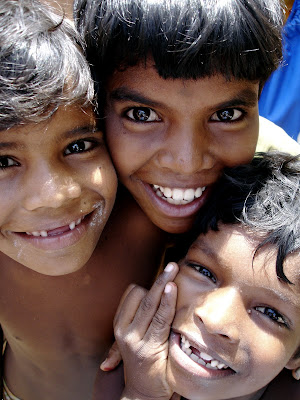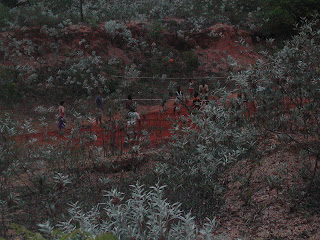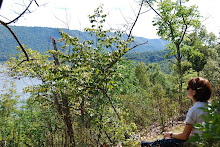
The local village of Morattandi recently had one of their summer temple festivals, in which Hindus join around the temple to pay homage to the gods in different ways. Sumathi and Chitra, the two primary house-help girls at FERAL for the students, took our group down to see the festival one afternoon. We loaded on SPF 50 sunscreen and set off, bottles of homemade Gatorade and cameras in tow.
When we got down to the temple, after a short hike through the dry sandy landscape from the FERAL property to the Morattandi village, there were many people gathered around the temple. We gaped at the temple that stood before us- it was a fairly modest structure, but it had been dressed up with lights, coconut palms and streamers of flags (the kind we see at American auto dealers).

Inside the temple was a large, unadorned room with a high ceiling. The crowd was making its way towards the back, where a smaller room with a shrine was located. I'm not completely sure what was going on back there, to tell the truth; I didn't want to push my way through. But suddenly a bell rang and out came a man with a flat metal bowl, in it a burning, scented smudge and a swirl of white and red powder. As the man with the bowl passed, each person wafted some of the smudge smoke toward her face and took a pinch of the powders and carefully put in on her forehead. I watched carefully, and with encouragement from Sumathi I took the smoke to my face as he passed.
Back outside, a group of bright-faced, friendly boys -- probably ages 5-8 -- swarmed around us. They practiced their introductory English on us: "Hello, how are you?"; "Name, please?"; "From where are you coming?" When they saw we had cameras, they asked for pictures ("Picture, please."). After I snapped a few photos, they ran to my side to see them on the camera's digital review screen. Their faces beamed as they laughed, pointing to the pictures and spouting exclamations in Tamil. When they'd seen them all, they'd quickly run a few feet away and pose for another photo. So I took more photos, and they'd run back to see them.

It was apparent that it was a treat for these village boys to be photographed and to see photos of themselves. They knew to come look at the pictures on the review screen, so perhaps they'd been photographed by someone with a digital camera before. More likely, though, these boys had heard about digital cameras from friends who had friends who'd been photographed by one.
Our photo shoot was interrupted when Chitra motioned for me to come inside the temple. I went to see what was happening, but I wasn't ready for what I saw. A man was standing up who'd just had limes hung from his face and chest by string tied to needles, which were punctured through his top layer of skin. I was shocked and for a moment wanted to run out of the temple. But because Chitra was at my side, I felt okay, and I stayed. Then, a young boy who looked to be 4 or 5 was approaching the chair. He looked so afraid. His elders plopped him into the chair to be next, and he began to cry. I watched as they pinched his skin, fed him banana and slid the first needles through. I looked at Chitra, motioned to the scene and asked, "Why?" But she didn't quite understand my question or didn't know how to explain, so she just said, "No pain." I looked one last time at the crying boy, and then we left.

On the walk home, Sumathi and I were talking as we brought up the rear. I told her what I had seen and asked why it was done. She explained in broken (but excellently understandable) English that this practice is done to a person after his/her serious sickness has broken; it is an act of gratitude towards the gods. The man and the little boy must've been very sick, but now they are healthy and want to show their devotion to the forces that healed them. Dr. Pelkey later told me that the acts of piety can come in many forms, but usually involve making a pledge to the gods that you will do something -- hang items (such as limes) from your skin, carry rocks on your head for a week, fast, walk backwards, basically anything out of your normal routine. I saw one girl in the temple who was in a squatted position, holding her ankles and moving by wobbling from one foot to the other. This is called the "frog walk," and it's a common manifestation of a pledge.
It's very hard for me to understand the intricacies of Hinduism, but I'm trying not to judge these demonstrations of Hindu faith by my learned American societal norms. It's just so interesting that these practices are very common here, but I've never heard of them at home. We're literally a world away.


